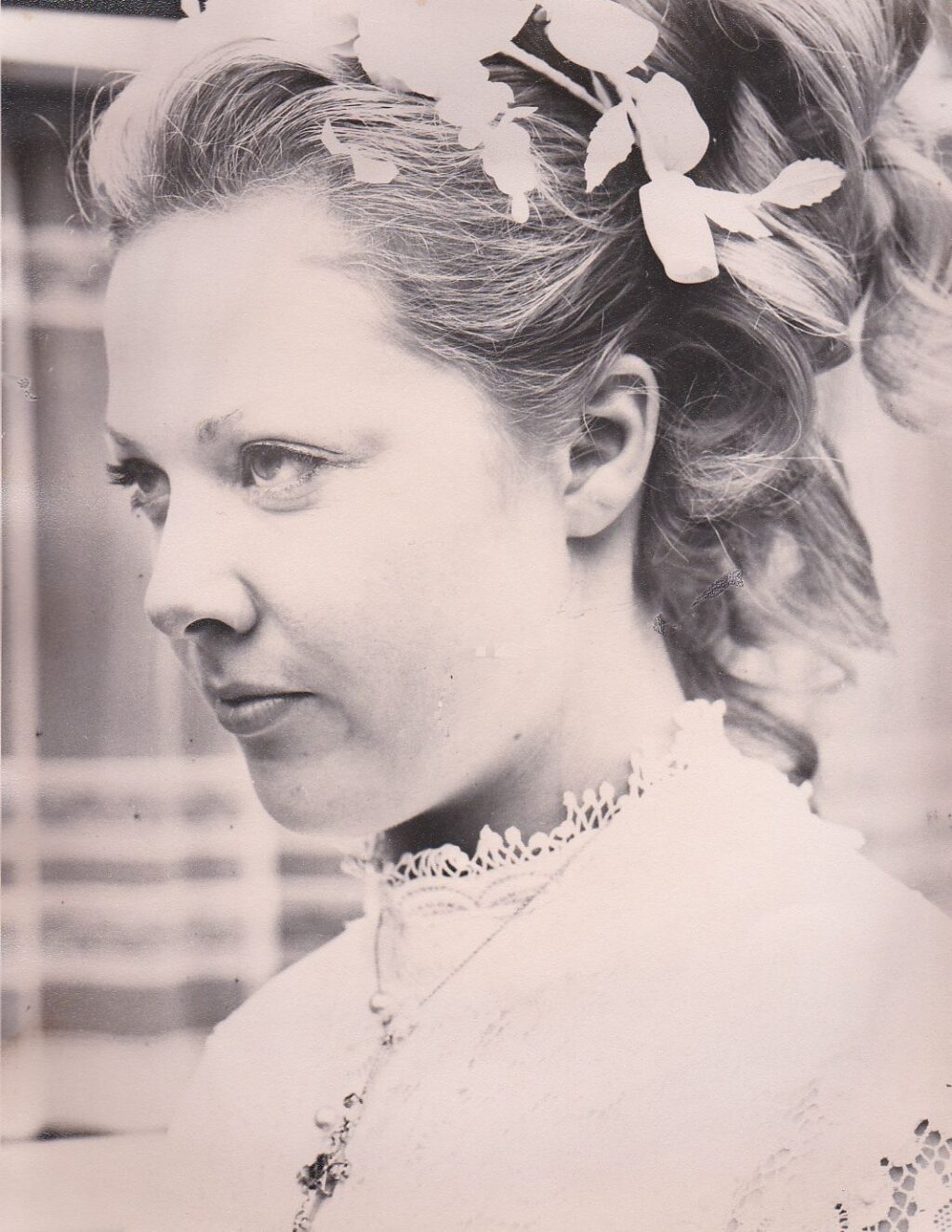Miss Impossible | The Official Schoolgirl Milky Crisis Blog

“Though in me you behold / the injury of many a blasting hour / Let it not tell your judgement I am old / Not age, but sorrow over me hath power.”
All right, strap in.
We had some arguments about the order of service. The cover image was pretty easy to decide upon. That’s my mother, not yet 22 years old, on her wedding day. She always wanted to be remembered as being young and beautiful, and it’s such a striking image.
The back cover was tougher. I found a nice one of her in Austria, but her partner, Ian, wanted something else.
“I want,” he said, “a picture that shows her doing what she loved best.”
“What?” I said. “Moaning?”
“No,” he said, “I want a picture of her on the Orient Express, when she was at her happiest.”
I remembered that she told me that when they took their last trip on the Orient Express, it was the last time she remembered walking into a room and everybody turning around and staring, ‘coz she was all dolled up, like someone who was just about to get murdered in an Agatha Christie novel. That was very important to her, and it was something that diminished as she got older, and she felt that she was becoming invisible. I said she should suck it up, because that’s how the rest of us have to live all the time.
Of all of you here today, only her sister Wendy has known her for every iteration, every period in her life. For the rest of you, I am sure that something I say will be news. And let’s start at the beginning. We don’t know why she was called Penelope, but we do know that her mother knew the story of the Odyssey, and who the original Penelope was. We think that she was named in honour of a wife who waited for years for her husband to come home from the war, which is indeed what my grandmother had just done.
There was a line of shops along Victory Parade, near the street where she grew up, and the butchers and the bakers, but presumably not candlestick makers, all called her Miss Impossible. I asked Wendy why, and she said it was probably something to do with her being such a prodigy, and so witty and talkative, but was it? Was it, really? Wasn’t it more likely that they were all sick of her imaginary friends, Yibbits and Yubbets, for whom doors had to be opened otherwise they would remain trapped in the shops?

Cousin John is here, with whom she and Wendy formed a club that met daily on an imaginary pirate ship at the bottom of the garden. For some reason, it was called Donna, and to get there, they had to navigate the garden on rollerskates, while carrying beanpoles. I don’t know why this is important, but I was supposed to tell you.
I want to mention something more relevant, I think, which is the influence of the Bulgin family, for whom my grandmother worked. They were something big in avionics, and had a mansion in Westcliff, and for some reason, they took her family under their wing, and showered them with kindnesses. It was visits to the Bulgins’ that instilled my mother with a love of art, of music, of plays and the finer things. They would get a hamper every Christmas from Fortnum & Mason, inspiring her ever after to what her own mother called her airs and graces.

She represented Essex in athletics, and led bizarre school singalongs in the chemistry lab, standing on a desk and conducted her classmates in rowdy renditions of wartime hits, waving a ruler in the air. She already displayed signs of her later commanding form. On being confronted by a flasher outside the school, she simply shouted at him: “Oh for God’s sake put it away!” and ran off laughing.
With her friend Pam, she’d go to see Elvis movies at the cinema, clutching a loaf of Hovis to eat in their seats. No, I know it’s weird. What can I say, times were different. They went to see Roy Orbison play the Odeon, and his support act was the Beatles. She thought they had nice jackets, but filthy shoes.

She converted to Catholicism, because life isn’t difficult enough. Her friend Rosi’s mum Val said to her: “Oh, you’ll love it, Pen, it’s very theatrical.” Which I find interesting because I always assumed her dramatic streak manifested in her twenties, but clearly it was earlier.
Perhaps you, like me, are fascinated with the work of Holland-Dozier-Holland, the songwriting team who made so many of Motown’s classics. No? Okay, just me, then. So I’d better point out that they tried to tailor their songs to be as general sounding as possible, and tried to avoid mentioning specific girls’ names. They made an exception for their 1967 hit “Bernadette.” Which, quite by coincidence I’m sure, my mother chose as her confirmation name.
On what must have been one of history’s most boring dates, she came here to this church, St Mary’s in Stoke by Nayland, to make brass rubbings with my father. Somewhere in this church, there is an image of a long-dead lady… oh, it’s there is it? Yep, okay, over there. And that image has hung in her houses ever since. It represented for her a vague, but ever solidifying yearning, to one day return to this place and live here. It would be thirty years before she did, but that was when it all started.
She went to work in Austria with my father, at a hotel in Mondsee. She still has an Austrian accent when she speaks German. They used the money to tour Europe, which was a real eye-opener for her, and she fell in love with its history and culture, so far removed from her Essex upbringing. When she eventually had children, her two sons, she would dress them up in lederhosen every Sunday, an experience from which neither of them has quite recovered.
She became active in the Southend Shakespeare Company, eventually rising to become its secretary. She played Ariel in The Tempest, and Perdita in A Winter’s Tale, which is why there is a picture of her in the gallery trying not to laugh at an unconvincing bear. And from there she graduated to the Royal Shakespeare Company, not as an actor, but as a dresser. For those that don’t know, when your leading man comes off stage covered in blood and you have to get him out of his armour and into his nightshirt for the next scene, the dressers are the wardrobe minions who have it all ready in the wings.
It meant that she literally had a backstage pass to Theatreland. When I was a child, we’d be in the street in Covent Garden, and she would suddenly say: “Oh, they’re kicking out for the interval at the Twelfth Night matinee. Let’s go to the green room.” And we’d walk up to this door in a back street, where Gareth Thomas and John Matshikiza were chuffing on cigarettes and trying not to get ash on their doublets.
She went back into secretarial work in the 1980s. Simon Wakefield is here, who was the man who hired her at Canewdon Consultants. And as that’s where she met Ian, basically everything that follows this moment is his fault. Ian had high hopes of retiring to the Costa del Sol and learning to play the guitar, but none of that happened after he met my mother. Instead, he found himself buying a house in Provence, where they spent many happy summers before it was fashionable.
She ended up at Cazenove Capital, which was the highlight of her career. There are some of you from Cazenove’s here today, and I we had a lovely letter from her former boss, saying that she used to administrate a charity on his behalf that I had never even heard of. They handed us a cheque for £500, so although it hasn’t showed up on the memorial webpage, it’s enough money to double the donations made in her name to Shelter. As of yesterday, when Tony and Christine pressed Send on their donation, the official total for donations on and off-line has gone over a thousand pounds, so well done, everybody. [Time Travel Footnote: Cazenove sent another cheque, the total is now at over £2,200].
She was my current age, 53, when she was made redundant, ironically just at the time when she and Ian had scraped together the money to buy their dream house in Suffolk. She wrote in her diary of a desire to reinvent herself, although God knows what as. Instead, there was a degree of bitterness that crept in, and she became a Woman of Letters. Money was a struggle until their pensions kicked in, and she wrote of the brutal awareness that she was too anxious to enjoy what she did have. In particular, she grew steadily annoyed at encounters with people who still had jobs, but were no good at them.
And we have a ream, an actual ream of paper in her files, of her draft letters of complaint to various bodies: the Alliance and Leicester, Prudential Insurance, Oak Farm, Dedham council, Southend United… I did intend to give a reading of some her most cutting remarks, but the Reverend Stéphane says that’s not what a eulogy is supposed to be. Although one of the things that has been really comforting to us since she died is the number of people with a funny story.
We have people here today who have come from Switzerland, and California, condolences from New Zealand and France and Hong Kong. And so many of them involve stories about her colourful language and creative invective. They begin with: “We’ll always remember…” and then it will be something crazy. Like my Australian friends, who said, “We’ll always remember that time when she got into a fight with Thorntons the Confectioners, over whether she could have a four-letter word as a cake decoration.”
“We’ll always remember that time she punched a horse….” No, I made that one up.
These ripples that we make in life, how people remember us, the effects that we have on each other’s lives, are fascinating to me. So many of you have mentioned moments, or interests, or decorations in their life that they owe to her, and they can be the most ridiculous things. I have a writer friend, who was the only person in her circle who didn’t get chapped hands during COVID, “…because I always used L’Occitane soap, and I first encountered it with your mother.” Or my friend Kimbers, in Texas, who said: “I’ll always think of your mother when I have spaghetti carbonara.”
Apparently, I was told, she’d never had spaghetti carbonara before, but the first time she ate it, she was sitting across from my mother in an Italian restaurant, and my mother was in full-on Apocalypse mode, ranting in a four-letter frenzy about the Bishop of Brentwood.
Just ahead of Brexit, my mother sent a Fortnum & Mason hamper across the border to me in my Finnish home. The natives crowded around it like jackals, peering in incomprehension at jars of Piccalilli and bespoke marmalade. It was a distant echo of the Bulgins’ kindnesses, half a century after they were dead. And I see some wag has actually put some of the flowers today in a Fortnum & Mason hamper… bravo.

You’ve told me about the effects she has had on the pictures on your walls, the books on your shelves, the music you listen to and the food you eat. And that’s been very comforting for us, to see fragments of her in other people’s lives.
Some of you have been surprised at the fact that she is being buried here, in the church she first visited as a twenty-year-old woman. You all listened to her witter for decades about how she wanted to have her ashes scattered all over Cornwall or something. But no, in 2022, she changed her will. She decided not just to live here, but to die here as well, which is why I invite all of you to walk with me down the Crown, where there will be Scotch Eggs for me and some sort of buffet nonsense for the rest of you, and to share more stories of her colourful, influential and often sweary life. Because when we are gone, the ripples we leave in the eyes of others are all that remains.

I didn’t know for sure what I was going to say when I stepped up to the lectern, but this was it as best I can remember it. Photos by Michael Clements, Kati Clements, Peter Finlay, and some others lost to time.
















